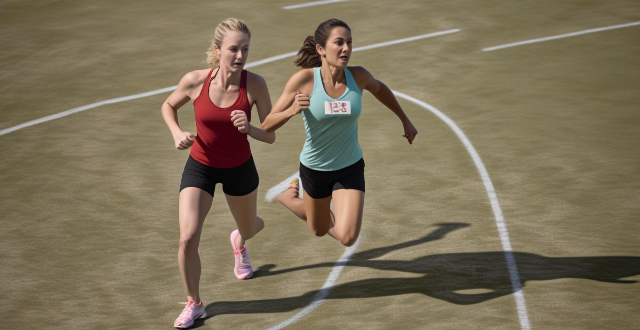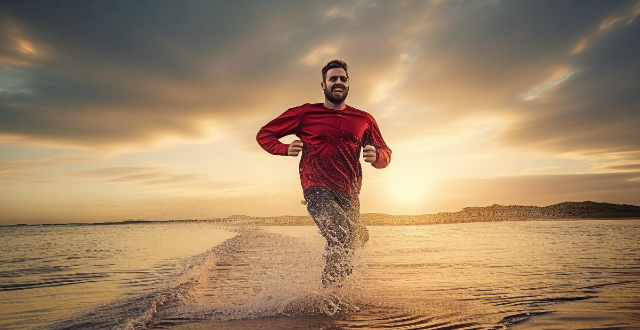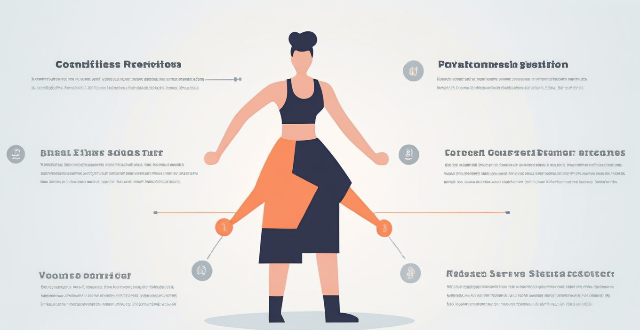Article Caffeine

Is there a connection between caffeine intake and sleep difficulties ?
The article discusses the connection between caffeine intake and sleep difficulties, highlighting factors such as individual sensitivity, timing of consumption, and the amount consumed. It explains how caffeine works in the body to increase alertness and reduces feelings of fatigue by blocking adenosine receptors. The article also outlines the effects of caffeine on sleep, including difficulty falling asleep, reduced deep sleep, frequent awakenings, and shortened REM sleep. To manage caffeine intake for better sleep, the article suggests limiting caffeine intake, avoiding late-day consumption, creating a bedtime routine, and monitoring personal response to caffeine.

How does caffeine influence workout intensity and results ?
Caffeine can boost workout intensity and results by increasing energy levels, improving focus, and enhancing endurance. However, it's important to be aware of potential side effects like dehydration risks, sleep disruption, and dependency issues. Moderation and individualized consideration are key when incorporating caffeine into a fitness routine.

Can eating habits affect my level of stress before an exam ?
Eating habits can significantly affect your level of stress before an exam. Proper nutrition is crucial for maintaining physical and mental well-being, which impacts your ability to handle stress and perform well during exams. Here are some ways in which eating habits can influence your stress levels: 1. **Blood Sugar Regulation**: Eating balanced meals and snacks throughout the day helps maintain stable blood sugar levels, avoiding mood swings and irritability that can increase stress. 2. **Brain Function**: Your brain requires essential nutrients to function properly. Foods rich in vitamins, minerals, and antioxidants support cognitive function and improve focus, memory, and concentration. 3. **Gut-Brain Connection**: There is a strong connection between your gut health and your mental state. Eating probiotic-rich foods promotes a healthy gut microbiome associated with better mood and reduced stress. 4. **Hydration**: Staying hydrated is essential for overall well-being and can impact your stress levels. Dehydration can lead to headaches, fatigue, and difficulty concentrating, adding to pre-exam stress. 5. **Caffeine Intake**: Moderate amounts of caffeine can provide a temporary boost in alertness, but excessive consumption can increase anxiety and interfere with sleep quality, important for stress management and cognitive performance. 6. **Comfort Eating**: Some people turn to food as a coping mechanism when stressed or anxious, leading to overeating or unhealthy choices that may provide short-term relief but ultimately exacerbate stress due to feelings of guilt or discomfort. By prioritizing nutrient-dense foods, staying hydrated, and avoiding excessive caffeine and comfort eating, you can support your body and mind in managing stress more effectively before an exam.

Is there a specific diet that can help with better sleep ?
Diet plays a crucial role in sleep patterns, with certain foods promoting relaxation and others disrupting sleep. The best foods for better sleep include turkey, milk, bananas, almonds, and chamomile tea, while caffeine, alcohol, spicy foods, sugary snacks, and heavy meals should be avoided before bedtime. Incorporating these dietary changes can help improve the quality of sleep and overall well-being.

What are the best sports nutrition supplements for enhancing athletic performance ?
The article discusses the importance of sports nutrition supplements in enhancing athletic performance. It highlights five key supplements that can help athletes improve their performance: 1. Protein Supplements: Essential for building and repairing muscles, protein supplements like whey, casein, and soy protein can support muscle growth, increase strength, and improve body composition. 2. Creatine Supplements: Popular among athletes for increasing muscle mass and improving performance during short, high-intensity exercise. Creatine also enhances recovery between workouts. 3. Beta-Alanine Supplements: An amino acid that increases muscle carnosine levels, beta-alanine can improve endurance capacity during high-intensity exercise, reduce fatigue, and enhance muscle strength and power. 4. Caffeine Supplements: A natural stimulant that can increase energy levels, reduce fatigue, improve mental focus, and enhance endurance capacity during prolonged exercise. 5. Multivitamins and Minerals Supplements: Important for overall health and well-being, multivitamins and minerals can help prevent nutrient deficiencies that could impair performance and enhance immune function and recovery from training. The article emphasizes the importance of choosing safe and effective supplements that meet the specific needs of an athlete and consulting with a healthcare professional or registered dietitian before starting any new supplement regimen.

Which celebrity just released a new song or album ?
This article discusses the latest releases from popular artists, including Taylor Swift's folklore-inspired single "Willow", Adele's highly anticipated comeback with her pop ballad "Easy On Me", and BTS's K-Pop album "BE (Deluxe Edition)". The article also encourages readers to discover new music and enjoy the talents of various musicians.

Are there any foods that can help alleviate stress ?
The text provides a summary of foods that can help alleviate stress, including dark chocolate, avocado, blueberries, salmon, and chamomile tea. Each food is explained in terms of its benefits and recommended intake. The article emphasizes that while these foods may help reduce stress levels, they should not be used as a substitute for professional medical advice or treatment.

Are there any budget-friendly options for heating and cooling my home efficiently ?
This article discusses budget-friendly options for efficient heating and cooling, including programmable thermostats, ceiling fans, ductless mini-split systems, and solar panels. It highlights the energy efficiency and cost-effectiveness of these solutions, as well as their customizable settings and aesthetic appeal. The article also emphasizes the importance of considering factors such as climate, local regulations, and personal preferences when choosing the best option for your needs.

How long should I nap during the day without affecting night-time sleep ?
Daytime naps can be advantageous for boosting energy and productivity, but it is essential to consider their duration to avoid impacting night-time sleep. The ideal lengths of daytime naps are the 20-30 minute power nap and the 90-minute recovery nap. It is crucial to avoid oversleeping during the day, which can lead to difficulty falling asleep at night. To make the most out of your nap time, find a quiet and comfortable place, limit caffeine intake, create a relaxing environment, set an alarm, be consistent, avoid napping too close to bedtime, and listen to your body. By following these tips, you can enjoy the benefits of daytime naps while still getting a good night's sleep.

What are some effective tips for falling asleep faster ?
Effective Tips for Falling Asleep Faster Falling asleep can sometimes be a challenge, especially when you're tired but your mind is racing. Here are some effective tips to help you fall asleep faster: - Stick to a Sleep Schedule: Try to go to bed and wake up at the same time every day, even on weekends. This helps regulate your body's internal clock. - Create a Bedtime Routine: Wind down before bed by engaging in relaxing activities such as reading or taking a warm bath. Limit screen time to avoid blue light interference with sleep. - Make Your Bedroom Conducive to Sleep: Ensure your bedroom is dark enough, keep it cool, and invest in comfortable mattress and pillows. - Limit Caffeine and Alcohol Intake: Avoid caffeine late in the day and limit alcohol consumption to avoid disrupting your sleep cycle. - Practice Relaxation Techniques: Deep breathing exercises, meditation, and progressive muscle relaxation can calm your mind and body. - Avoid Naps During the Day: If you struggle with falling asleep at night, avoid napping during the day or limit naps to 20-30 minutes early in the afternoon. - Get Regular Exercise: Exercise regularly but avoid intense workouts close to bedtime. Choose morning or early afternoon exercise sessions to improve sleep quality without disrupting your sleep schedule.

How does sleep impact reaction time and coordination in sports ?
Sleep is a critical determinant of athletic performance, significantly influencing reaction time and coordination. Adequate rest is crucial for muscle recovery and cognitive functions after daytime activities. Studies show that approximately 50%-78% of elite athletes suffer from some form of sleep disorder, with about 25% experiencing severe disorders. Shortened sleep duration negatively affects athletic abilities such as strength and anaerobic capacity. It also increases the risk of injuries by up to 1.7 times in those sleeping less than 8 hours per night. Proper sleep enhances cognitive functions, including decision making and reaction time, which are critical for success in sports. Sleep plays a vital role in the consolidation of motor skills, essential for coordination and precision in sports. Adequate sleep can reduce injury risks by up to 60%, suggesting better muscle recovery and maintenance of physical coordination. Short naps (20-30 minutes) can significantly improve alertness, attention, and overall mental state, leading to better performance. For athletes with sleep deficits, naps have been shown to ameliorate physiological and cognitive conditions, enhancing athletic performance. Combining a short nap with caffeine consumption can be an effective strategy to reduce post-lunch drowsiness and boost afternoon performance. Athletes aged 25 and above tend to report poorer sleep quality than their younger counterparts, indicating varying sleep needs across different age groups. Female athletes are more likely to experience sleep issues, necessitating tailored sleep strategies. Youth athletes should aim for 8 to 10 hours of sleep to support their developmental needs, while adult athletes should target 7 to 9 hours of sleep to ensure adequate recovery and performance optimization.

Can regular exercise help with insomnia ?
Insomnia, a sleep disorder making it hard to fall or stay asleep, affects many. Regular exercise is emerging as a natural remedy for insomnia. Exercise can positively impact sleep quality and duration by regulating the circadian rhythm and releasing endorphins. It also reduces stress and anxiety, leading causes of insomnia. Regular exercise boosts energy levels and mental health, further promoting better sleep. The recommended amount is 150 minutes of moderate-intensity activity weekly, including muscle-strengthening exercises. Tips for exercising with insomnia include choosing low-impact activities, avoiding high-intensity workouts at night, establishing a routine, being mindful of caffeine intake, and consulting a doctor before starting an exercise program.

Can certain foods or dietary habits influence our ability to concentrate ?
The influence of certain foods and dietary habits on our ability to concentrate is significant. Consuming caffeine in moderation can enhance alertness, while staying hydrated is crucial for cognitive performance. Protein helps balance blood sugar levels, healthy fats support brain health, and avoiding high sugar intake prevents energy crashes. Iron, vitamins B6, and B12 are essential for cognitive function. By choosing nutrient-dense foods and adopting healthy dietary habits, we can support optimal cognitive function.

What is the difference between sports nutrition supplements and regular multivitamins ?
Sports nutrition supplements are designed for athletes and those who engage in regular physical activities, aiming to improve performance, increase muscle strength, and support recovery. Common ingredients include protein, creatine, beta-alanine, BCAAs, and caffeine. In contrast, regular multivitamins cater to the general population, focusing on maintaining overall health by filling nutrient gaps. Typical ingredients are vitamins A, C, D, E, K, B-complex, minerals like calcium, iron, zinc, magnesium, and trace elements. The benefits of sports nutrition supplements revolve around enhanced athletic performance, while regular multivitamins promote immune function, nutrient intake, and general well-being.

What are the best ways to improve female fertility naturally ?
The text provides a comprehensive guide on the best ways to improve female fertility naturally. It emphasizes the importance of maintaining a healthy weight, managing stress levels, optimizing nutrition, tracking ovulation, limiting caffeine and alcohol intake, quitting smoking, and avoiding excessive exercise. The text explains why each method matters and how to achieve it. It also suggests seeking support from healthcare professionals before starting any new regimen related to fertility enhancement.

How does nutrition affect women's fertility ?
Nutrition plays a crucial role in women's fertility, affecting both their physical and mental health. Being underweight or overweight can negatively impact fertility, as can a diet that is too low or too high in calories. Vitamins and minerals play important roles in hormone production and metabolism, and deficiencies in certain vitamins and minerals can negatively impact fertility. Eating a balanced, healthy diet that includes plenty of fruits, vegetables, whole grains, lean protein, and healthy fats can improve overall health and fertility. Excessive alcohol consumption, caffeine intake, micronutrient deficiencies, environmental factors like pollution and exposure to toxins, stress, and smoking can also negatively impact fertility. Maintaining a healthy diet, lifestyle, and environment can positively impact women's fertility by supporting overall health and hormone balance.

What should I do after intense exercise
7 tips for post-workout recovery: cold shower, hydration, healthy snacks, rest, stretching, avoid alcohol and caffeine, and sleep.

How do I choose the right backpack for my outdoor adventure ?
The article provides guidance on how to choose the right backpack for outdoor adventures. It suggests considering factors such as size and capacity, comfort, durability, organization, and accessibility. The article also offers tips for trying on a backpack, including wearing appropriate clothing, adjusting straps, adding weight, and taking a test walk.

What are some tips for managing menstrual cramps through diet ?
Managing menstrual cramps can be achieved through dietary changes. Incorporating magnesium-rich foods, anti-inflammatory foods, staying hydrated, limiting caffeine and sugar, eating small, frequent meals, and considering herbal teas are some tips to alleviate the discomfort. It's crucial to listen to your body and find what works best for you. If symptoms are severe or persistent, it's recommended to consult with a healthcare professional.

How can I improve my sleep quality ?
Improving sleep quality involves establishing a bedtime routine, creating a comfortable sleep environment, limiting caffeine and alcohol intake, avoiding electronics before bed, exercising regularly, managing stress levels, and considering natural sleep aids.

How can children be encouraged to speak up if they feel unsafe ?
The article emphasizes the importance of creating a safe and supportive environment for children to express themselves without fear of judgment or criticism. It suggests educating children about personal safety, role-playing different scenarios, and discussing potential consequences of not speaking up if they feel unsafe. The article also recommends teaching children who to trust, encouraging them to use their voice, and providing options for seeking help. Overall, it highlights the significance of empowering children to take action and advocate for their own safety.

Can economic growth be achieved while also protecting the environment ?
The article explores the complex relationship between economic growth and environmental protection. It presents two perspectives: the trade-off perspective, which suggests a conflict between the two goals, and the win-win perspective, which argues that they can coexist. The article then outlines strategies for achieving both objectives, including investing in green technology, promoting sustainable business practices, implementing government policies, and raising public awareness. It concludes that collaboration among stakeholders is necessary to create a sustainable future.

What are some effective techniques for improving concentration and focus ?
Concentration and focus are crucial skills for achieving goals, whether it's studying, working, or enjoying a hobby. Here are some effective techniques to improve them: minimize distractions by turning off notifications and finding a quiet place; take short breaks every hour or use the Pomodoro technique; practice mindfulness through meditation and deep breathing; set clear goals and prioritize tasks; eliminate multitasking and focus on one task at a time; get enough sleep and create a relaxing bedtime routine; exercise regularly to enhance cognitive function; stay hydrated to avoid fatigue; use visual cues like charts and diagrams; and limit caffeine intake to avoid jittery feelings.

How can we deal with jet lag during an international family trip ?
Jet lag, also known as desynchronosis or flight fatigue, is a physiological condition which can cause various issues such as insomnia, irritability, and difficulty concentrating. It occurs when our body clock gets disrupted due to rapid travel across time zones. Here are some tips on how to deal with jet lag during an international family trip: 1. Adjust Your Sleep Schedule Before Departure: Before embarking on your journey, try to gradually adjust your sleep schedule to match the time zone of your destination. 2. Stay Hydrated and Avoid Alcohol and Caffeine: Dehydration can exacerbate jet lag symptoms, so it's important to drink plenty of water while flying. Avoid alcohol and caffeine as they can further dehydrate you. 3. Get Some Sunlight: Expose yourself to sunlight as soon as possible after arrival. Natural light helps regulate our body's internal clock and can help you adjust to the new time zone more quickly. 4. Take Short Naps: If you feel tired upon arrival, take a short nap (no more than 20-30 minutes) to recharge yourself without disrupting your nighttime sleep schedule. 5. Stay Active During Daytime: Engage in physical activities during the daytime at your destination to help keep you awake and alert. This will also help you fall asleep more easily at night. 6. Use Melatonin Supplements: Melatonin supplements can help regulate sleep patterns by mimicking the effects of natural melatonin production in the body. Consult with a healthcare professional before taking any supplements. 7. Consider Using Light Therapy Devices: Light therapy devices emit bright light that mimics sunlight and can help reset your body's internal clock. These devices are available for purchase online or at specialty stores. 8. Be Patient: It takes time for your body to fully adjust to a new time zone, so be patient with yourself and give your body the rest it needs to recover from jet lag.

What are some unique street food dishes from around the world ?
This article provides an overview of various unique street food dishes from different parts of the world. It highlights dishes such as Poutine from Canada, Ceviche from Peru, Satay from Indonesia, Falafel from the Middle East, and Jalebi from India. The article describes each dish's key ingredients and characteristics, highlighting their cultural significance and culinary traditions.

What are some examples of recent extreme weather events ?
This article discusses recent examples of extreme weather events that have caused significant damage to human life, property, and the environment. These include Hurricane Ida (2021), Australian Bushfires (2019-2020), California Wildfires (2020), European Heatwave (2019), Japanese Typhoon Hagibis (2019), and Indian Cyclone Amphan (2020). The article concludes by emphasizing the need for individuals, communities, and governments to take action to mitigate the effects of these events and adapt to changing weather patterns.

What role does credit scoring play in credit management ?
This article discusses the importance of credit scoring in credit management. It explains what credit scoring is, its role in risk assessment, fairness and objectivity, efficiency and accuracy, customization, and compliance with regulations. The article emphasizes that credit scoring is a crucial tool for lenders to evaluate borrowers' creditworthiness and make informed decisions about approving loans.

What is a good workout routine for beginners at the gym ?
This article provides a comprehensive guide for beginners on how to start a workout routine at the gym. It includes warm-up exercises, cardiovascular and strength training exercises, and cool down stretches. The article emphasizes the importance of starting slowly and gradually increasing the intensity of workouts. With dedication and consistency, beginners can achieve their fitness goals and improve their overall health and well-being.

How have recent climate disasters impacted the discourse on global climate governance ?
The article discusses how recent climate disasters have impacted the discourse on global climate governance. It highlights increased awareness and urgency of addressing climate change, focus on resilience and adaptation measures, and the need for collaboration and cooperation among nations. The article concludes that effective strategies and policies are necessary to mitigate the impacts of climate change and ensure a sustainable future.